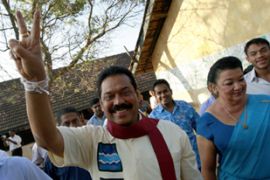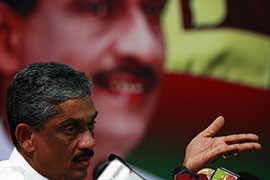Rajapaksa ahead in Sri Lanka vote
Early results give incumbent big lead amid tensions as troops surround rival’s hotel.

Fonseka surrounded
Tensions were mounting on Wednesday, however, after troops surrounded the Cinnamon Lakeside hotel in Colombo where Fonseka is staying.
Al Jazeera’s Mike Hanna, reporting from the capital, said the intense cordon of hundreds of military personnel was, according to the presidential office, for Fonseka’s protection.
| in depth | |||||||||||
|
The opposition candidate has admitted he was not registered as a voter and the presidential office said that revelation could create security issues, our correspondent said.
Fonseka told the Reuters news agency by phone that “these people have surrounded the hotel with military and threatened my security people”.
“They had a plan to surround us and take us into custody and I don’t know if this is that phase of that particular operation.”
A spokesman for the military denied there were plans to arrest Fonseka but said about 400 people, including alleged army deserters, were inside the hotel with the general.
“We don’t know what’s their motive and as a protective measure, we have deployed troops around the hotel and people who go in and come out are being checked,” Brigadier Udaya Nanayakkara told The Associated Press news agency.
In the final days of the campaign Fonseka had said the government had plans to either steal the vote or arrest him should he win.
The government dismissed the allegation, saying Rajapaksa would win the race cleanly and had no need to cheat.
Susan Hayward, a Sri Lanka analyst at the US Institute for Peace, told Al Jazeera that the government appeared to be concerned that those opposed to the possible re-election of Rajapaksa may take to the streets.
“There has been increasing reliance on the military in Colombo in the last few years,” she said.
Coup suspicions
A senior military source and a senior presidential aide told Reuters that Fonseka had been put under watch to ensure he did not attempt to organise a coup with his own loyalists in the army he commanded just eight months ago.
“The government doesn’t want him to take the first step towards a coup,” the military officer said on condition of anonymity.
The former army chief fell under suspicion of plotting a coup immediately after the war, which analysts say led Rajapaksa to promote him to a job with no control over troops.
Fonseka said the sidelining and accusations prompted him to retire from the military and enter the presidential race.
The two men are considered heroes by the country’s Sinhalese majority for their leading role in defeating the Tamil Tiger separatists in their 25-year campaign for an independent Tamil state.
While voting among the Sinhalese majority appeared to be strong on Tuesday, turnout was sparse in some northern Tamil areas, where the most intense fighting drove hundreds of thousands from their homes.
The minority community had been expected to support Fonseka and play a possibly pivotal role in the results.
As army commander, Fonseka ran a relentless military campaign to crush the Tigers, while Rajapaksa deflected an international push for a ceasefire and criticism over mostly Tamil civilian deaths that have prompted calls for a war crimes probe.
Not on the rolls
On Tuesday, Fonseka found himself in the embarrassing position of telling reporters he “may have voted” but did not want to say if he had “due to security reasons”.
 |
| Fonseka’s supporters say he was too busy fighting a war to register as a voter [Reuters] |
He later admitted he was not on the voter rolls but supporters say he was too busy fighting against the Tamil Tigers in 2008 when registration for the elections closed.
The government announced after polls closed that it would seek court action to disqualify him from the race.
However, the country’s electoral commissioner later issued a statement saying Fonseka’s status on the voter rolls was irrelevant to his candidacy.
On the issue of voter fraud, Hayward, the Sri Lanka analyst, told Al Jazeera that there had been reports of some irregularities.
“The Centre for Monitoring Election Violence has given some reports of rigging,” she said, adding that some people had questioned the results of postal votes.
Early counting from postal votes – cast by soldiers, police and civil servants working on election day – showed Rajapaksa winning most districts with 62.9 per cent to 36.1 per cent for Fonseka, with the remainder spread out among some 20 other candidates.
